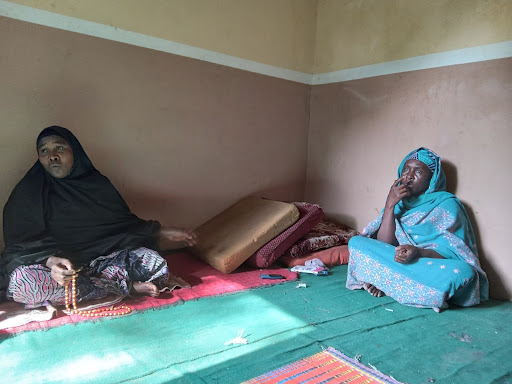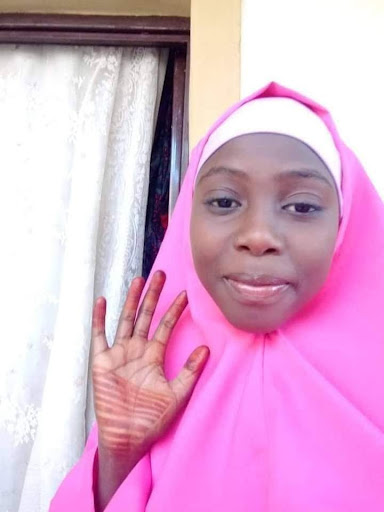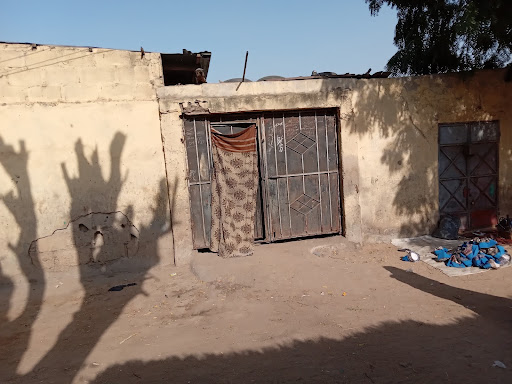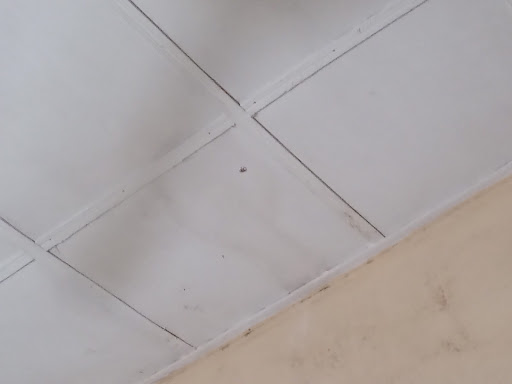Maiduguri Girl’s Death Raises Concerns About Celebratory Gunfire Accidents
On new year’s day, a sleeping 14-year-old girl was hit in the head by a bullet that came through the roof of their bedroom, and no one knows who fired the shot.

A bereaved family in Maiduguri, capital of Borno in Northeast Nigeria, are still grieving, a week after their daughter was killed by a bullet fired into their home in the early hours of Jan. 1.
Maryam Mustapha, 14, was sleeping in their bedroom together with her mother and three other siblings when a deafening gunshot bang woke them up at about 1 a.m.
Maryam felt some heaviness on her head and called the attention of her mother who thought she may have hit her head on the wooden wardrobe near where she was lying down. The teenage girl, who was a primary 4 pupil, kept complaining of pain in her head.
“So I had to ask her to remove the Hijab she was wearing due to the cold weather and, when she did, I saw blood gushing down the side of her head,” Aisha Mustapha, Maryam’s mother, informed HumAngle.
She had to get some clothing to wrap her head and then gave her some pain medication, hoping to take her to the hospital at dawn.
“In the morning when we woke up to pray, I saw my daughter behaving strangely and then she suddenly slumped and fainted,” she said.
“We did all we could to resuscitate her and when she came around she fainted again. So I rushed her to a nearby clinic where the nurses examined her and said we had to rush her to the Teaching Hospital, and that her injury was very serious.”
At the University of Maiduguri Teaching Hospital (UMTH), the doctors insisted that they required a police report because the injury was inflicted by a gunshot. Nigeria had in 2017 passed a law mandating hospitals to immediately treat people with gunshot wounds even though they do not have police clearance, but many health facilities still disregard this.
“It was while trying to get the police from our divisional area to provide the report after explaining to them what transpired that Maryam passed away,” said Aisha in tears.

How Maryam was killed
The bullet that killed her daughter came through the ceiling of their bedroom roof, Aisha said, pointing at a tiny hole in the ceiling. HumAngle, however, observed no security outpost close to the house, which is located in the centre of Umarari, a crowded suburb off the popular Baga road.
“We were woken by a loud sound like that of a gunshot at about 1:30 a.m.,” Aisha said.
“The sound was strange. We knew there was a distant shooting of crackers by youths to celebrate the new year at midnight, but those sounds died down as we went back to sleep. The last sound was closer and it was like coming from outside our house. We all woke up and that was when Maryam complained that her head was aching.”
The family did not notice the hole left along the bullet’s trajectory on the ceiling until they returned home to prepare the corpse for burial.
“We were told that the injury was caused by a bullet wound. And even when we were bathing her corpse, we felt the bullet inside her face and it had slid down to the cheek,” said the mother.

A mysterious bullet
The home of the Mustaphas’ is located right inside Umarari in the Bolori II Ward of Maiduguri. From all flanks, it is a distance away from the main roads. It takes about five minutes to walk the footpaths that snake through tiny streets to get to the house.
HumAngle observed that there were no nearby military or related security posts where a gunshot could have been fired. Strangely, the bullet that killed the teenage girl came dropping from above the house.
“We still don’t know who fired the shot and why it came through the roof and not the wall,” the mother said even as she struggled to withhold tears in her eyes.
Neither the family nor the neighbours around the house could explain how the bullet strayed into the bedroom. But what they were sure of was that there were celebratory firearm shootings to mark the new year that night.
“Falling or stray bullets associated with celebratory gunfire are known to cause human fatalities and injuries. This risk increases with a .50 caliber machine gun,” noted Murtala Abdullahi, HumAngle’s Head of Armed Violence. “In this case, it appears to be a falling bullet with sufficient kinetic energy to pierce the roof and hit the child.”
Abdullahi added that it was important for the military to investigate the incident not only to get justice for the family but also to prevent recurrences.
Disturbing trend
Fatima’s death was not the first to be caused by a stray bullet in Maiduguri, especially in non-hostile circumstances. Innocent civilians in the volatile region have not only lost their lives to the Boko Haram insurgency but through injuries caused by stray bullets — especially due to unprovoked shooting from trigger-happy soldiers and members of the Civilian Joint Task Force (CJTF).
In Jan. 2018, a year-old boy sleeping beside his mother in Maiduguri was badly injured by a stray bullet fired by a soldier. A year later, Aisha Mohammed was killed by a stray bullet fired by soldiers celebrating the new year. The bullet killed her as she was sleeping in her home located near the 7 Division Garrison of the Nigerian Army along Pompomari bypass in Maiduguri.
Also, Janada Yamta, a seven-year-old girl was killed by a stray bullet that was fired during a clash between soldiers and men of the police Counter-Terrorists Unit in June 2019.
Sometime in 2020, a soldier of the Nigerian army had while attending a civilian wedding in London-Ciki, a crowded suburb of Maiduguri, decided to shoot into the sky to celebrate the nuptials. The bullet, however, ended up in the chest of an 11-year-old boy who died instantly.

The Peace Ambassadors Center for Humanitarian Aid and Empowerment, a Maiduguri-based NGO and rights group, had last weekend raised concerns over the spate of deaths and injuries caused by stray bullets within the town.
Ahmed Shehu, the head of the Peace Ambassadors Forum, said his team had also visited the home of the deceased 14-year-old girl. He said the Forum met the family at the hospital as they struggled to save their daughter’s life.
“As usual, the complicated aspect of the debate between victims of the bullet and police report brought its ugly head, which forced the relatives to transit between Gwange Police Station, located close to the hospital and Ibrahim Taiwo Estate Police station, which serves the victim’s Community. Unfortunately, Maryam was lost to the cold hands of death before receiving further support,” he told HumAngle.
“The general perception from the community was that Maryam was killed by a stray bullet from some security personnel stationed nearby while celebrating the arrival of the year 2022,” he added.
The rights activist said the community could be excused for their yet-to-be-substantiated assumption because in Maiduguri “only the security agencies have the custody of firearms that could be fired at such non-hostile moments”. Residents are hoping for more regulation in the use of firearms.
Shehu and his team are advocating for the introduction of laws that protect civilians in conflict areas for instance by providing for emergency programme’s and the repair of damaged infrastructure.
Though the family of Late Maryam said they had reported the matter to a divisional police headquarters in Maiduguri, there hasn’t been any formal statement from the police command concerning the matter.
An officer at the Ibrahim Taiwo Extension of the divisional headquarters who spoke to HumAngle on condition of anonymity, however, confirmed receiving a report on the girl’s death.
“You see, there is a limit to what the police can do for now on this matter because Borno is under a security state of emergency and matters like this are better handled by the military,” the source said.
Support Our Journalism
There are millions of ordinary people affected by conflict in Africa whose stories are missing in the mainstream media. HumAngle is determined to tell those challenging and under-reported stories, hoping that the people impacted by these conflicts will find the safety and security they deserve.
To ensure that we continue to provide public service coverage, we have a small favour to ask you. We want you to be part of our journalistic endeavour by contributing a token to us.
Your donation will further promote a robust, free, and independent media.
Donate HereStay Closer To The Stories That Matter




